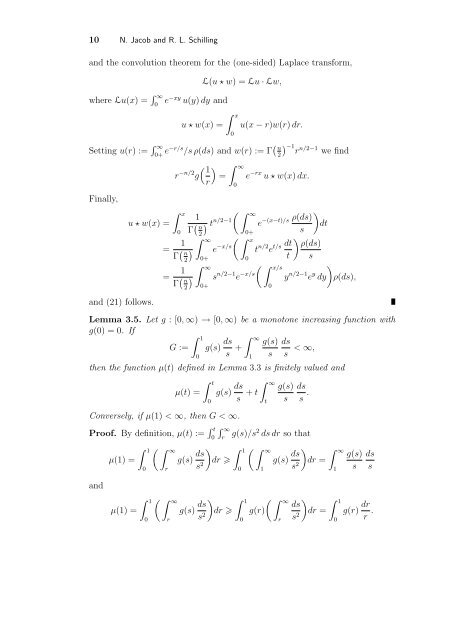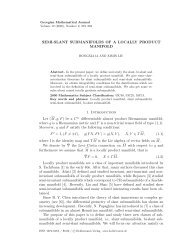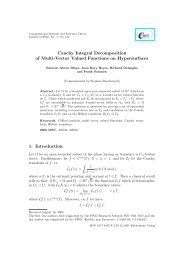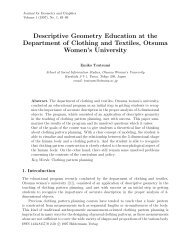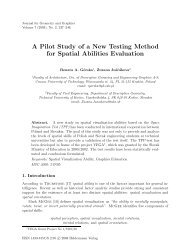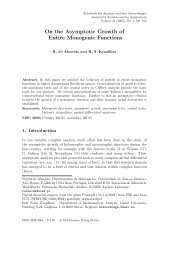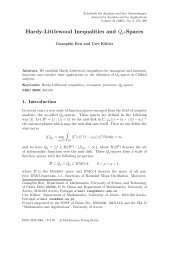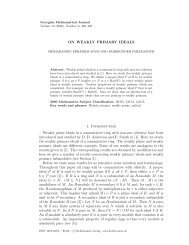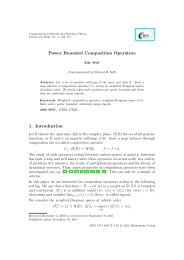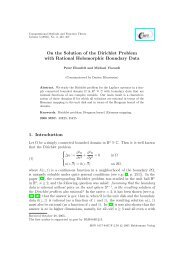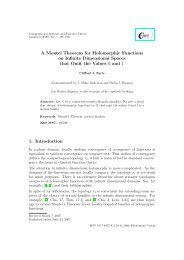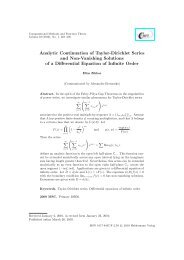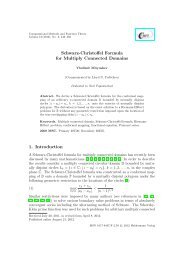Function Spaces as Dirichlet Spaces (About a Paper by Maz'ya and ...
Function Spaces as Dirichlet Spaces (About a Paper by Maz'ya and ...
Function Spaces as Dirichlet Spaces (About a Paper by Maz'ya and ...
You also want an ePaper? Increase the reach of your titles
YUMPU automatically turns print PDFs into web optimized ePapers that Google loves.
10 N. Jacob <strong>and</strong> R. L. Schilling<br />
<strong>and</strong> the convolution theorem for the (one-sided) Laplace transform,<br />
where Lu(x) = ∫ ∞<br />
e −xy u(y) dy <strong>and</strong><br />
0<br />
u ⋆ w(x) =<br />
L(u ⋆ w) = Lu · Lw,<br />
∫ x<br />
0<br />
u(x − r)w(r) dr.<br />
Setting u(r) := ∫ ∞<br />
0+ e−r/s /s ρ(ds) <strong>and</strong> w(r) := Γ ( )<br />
n −1r n/2−1 we find<br />
2<br />
Finally,<br />
<strong>and</strong> (21) follows.<br />
( 1<br />
)<br />
r −n/2 g =<br />
r<br />
∫ ∞<br />
0<br />
e −rx u ⋆ w(x) dx.<br />
∫ x<br />
( ∫<br />
1<br />
∞<br />
)<br />
u ⋆ w(x) =<br />
0 Γ ( ) t n/2−1 −(x−t)/s ρ(ds)<br />
e dt<br />
n<br />
2<br />
0+<br />
s<br />
= 1 ∫ ∞<br />
( ∫ x<br />
)<br />
Γ ( ) e −x/s t n/2 t/s dt ρ(ds)<br />
e<br />
n<br />
2 0+<br />
0 t s<br />
= 1 ∫ ∞<br />
( ∫ x/s<br />
)<br />
Γ ( ) s n/2−1 e −x/s y n/2−1 e y dy ρ(ds),<br />
n<br />
2 0+<br />
0<br />
Lemma 3.5. Let g : [0, ∞) → [0, ∞) be a monotone incre<strong>as</strong>ing function with<br />
g(0) = 0. If<br />
∫ 1<br />
G := g(s) ds ∫ ∞<br />
s + g(s) ds<br />
s s < ∞,<br />
0<br />
then the function µ(t) defined in Lemma 3.3 is finitely valued <strong>and</strong><br />
µ(t) =<br />
∫ t<br />
Conversely, if µ(1) < ∞, then G < ∞.<br />
Proof. By definition, µ(t) := ∫ t<br />
0<br />
∫ 1<br />
( ∫ ∞<br />
µ(1) =<br />
0<br />
r<br />
0<br />
g(s) ds<br />
s 2 )<br />
dr <br />
1<br />
g(s) ds<br />
s + t ∫ ∞<br />
t<br />
g(s)<br />
s<br />
ds<br />
s .<br />
∫ ∞<br />
g(s)/s 2 ds dr so that<br />
r<br />
∫ 1<br />
( ∫ ∞<br />
0<br />
1<br />
g(s) ds ) ∫ ∞<br />
g(s) ds<br />
dr =<br />
s 2 1 s s<br />
<strong>and</strong><br />
µ(1) =<br />
∫ 1<br />
0<br />
( ∫ ∞<br />
r<br />
g(s) ds<br />
s 2 )<br />
dr <br />
∫ 1<br />
0<br />
( ∫ ∞<br />
)<br />
ds<br />
g(r) dr =<br />
r s 2<br />
∫ 1<br />
0<br />
g(r) dr<br />
r .


